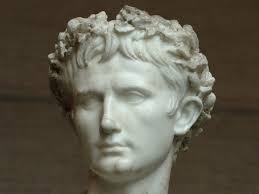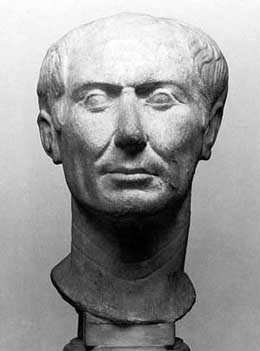The Apotheosis of Emperors. Understanding the History of Empires in the 21st Century

feature image: Augustus
Sometimes it may be instructive to look beyond foreign policy and pay attention to the actors and their words. I was struck by one of Trump’s tweets of this week not because of the threatening reference to Turkey (“I will totally destroy and obliterate the Economy of Turkey”) or the reason given (if Turkey…considers to be off limits”), but by his parenthetical statement “in my great and unmatched wisdom”. No one – maybe not even his supporters – would question the fact that Trump has a huge ego (problem) but his self-declared prowess in wisdom does show lack of modesty to say the least.
I have been reading about the Roman Empire lately so my reflection is triggered in part by my reading.
Augustus who came to power in Rome in 27 BC is recognized as the first Roman emperor for his contribution to the building of the empire through conquests and exploitation of other peoples.
 Augustus came to power after a period of civil unrest following the murder of dictator Julius Caesar (statue in image) in 44 BC. was Augustus’ great-uncle and adoptive father and he had already made great military conquests for Rome. For that reason after his death his followers and admirers recognized him as a god and called him the Divine Julius. He was the first Roman to be deified and several temples were built to worship him. Consequently, his adoptive son, Octavian – later renamed Augustus, meaning “expansionist” – was also referred to as the “son of god”.
Augustus came to power after a period of civil unrest following the murder of dictator Julius Caesar (statue in image) in 44 BC. was Augustus’ great-uncle and adoptive father and he had already made great military conquests for Rome. For that reason after his death his followers and admirers recognized him as a god and called him the Divine Julius. He was the first Roman to be deified and several temples were built to worship him. Consequently, his adoptive son, Octavian – later renamed Augustus, meaning “expansionist” – was also referred to as the “son of god”.
The interesting part about Augustus is that he did not have the patience to wait for his death to be elevated to infallible godliness. So he went ahead and decided that he had “great and unmatched wisdom” to proclaim himself god and to join the roster of Roman gods by realizing his own apotheosis (transformation into god). After all, he was already the son of one.
Of course, that had nothing to do with religion or philosophy. Aside from the megalomaniac and egocentric reason, there was a political angle to that decision. The expanding Roman Empire could not sustain itself by its army alone. Also, while the emperor was away from Rome for long periods of time conquering lands, Roman senators may have grown disloyal to him and provoke his physical demise. This situation required a way to ensure the loyalty of all people of the empire. After all, Julius Caesar was brutally murdered by a group of rebellious senators who were not loyal to him. Incidentally, among them one was called Brutus, which makes you wonder if that is where the word “brutal” – as in brutal assassination – comes from.
What better way to hope for loyalty than by claiming to be god? Who would murder a god that by definition must be worshipped by people?
The stratagem may have worked for him. Certainly he was not impeached. In fact, Augustus may have died of natural causes in 14 AD at the age of 75 after ruling for 41 years. But history is not definitive on this. Some historians claim that his third wife Livia poisoned him. She would have known the “real Augustus” beyond the worshipped Augustus.
Aside from the ruins of their monuments and buildings that remain today as witness of their existence, mostly in Rome, those who use the Gregorian calendar today allude to their legacy every time they mention the months of July (named after Julius Caesar) and August (named after Augustus). They are the only two “human gods” in the calendar, while the months of January, March and May were named after mythical gods.
Looking at this snapshot of ancient history a couple of reflections may be drawn as conclusion. Seeking worship may not be a good idea for the worshipped. That would necessarily involve the need to “destroy and obliterate” any competitor in the worshipping arena. During the reign of Augustus a strong competitor to godliness was born in the year 1. He was eventually crucified (the standard way of torturing people to death in those days) under the reign of emperor Tiberius who was the adopted son of Augustus, and therefore a son of god himself. But worshippers should also beware that worship is not good for them either since they may be punished at the slightest deviation by firing, demotion or worse.
Finally, Augustus is quoted saying, “I found Rome a city of bricks and left it a city of marble”, in reference to his grandiose contribution to the city. One might say he made Rome great again. However, the apotheosis of the emperor did not prevent the eventual collapse and literal pillage of all the marble of the Roman Empire, albeit a few centuries later.
All of that is now history, but how much of an empire’s ancient history can teach us in the 21st Century?
*
Note to readers: please click the share buttons above or below. Forward this article to your email lists. Crosspost on your blog site, internet forums. etc.
This article was originally published on OneWorld.
Nino Pagliccia is an activist and freelance writer based in Vancouver. He is a retired researcher from the University of British Columbia, Canada. He is a Venezuelan-Canadian who follows and writes about international relations with a focus on the Americas. He is the editor of the book “Cuba Solidarity in Canada – Five Decades of People-to-People Foreign Relations” (2014). He is a frequent contributor to Global Research.

